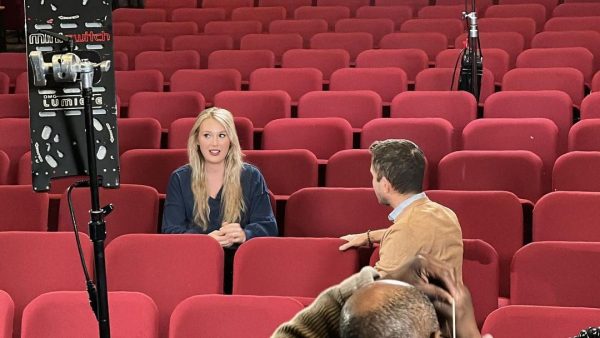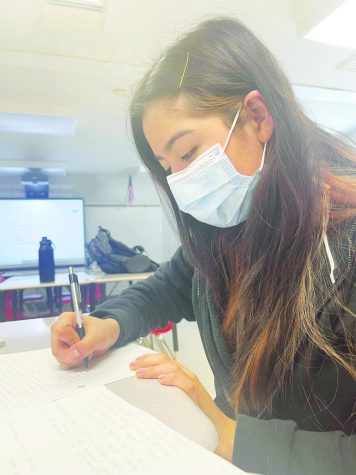A Solution to Censorship
VA House of Delegates proposes bill to give free speech to students journalists
Last week, the Virginia House of Delegates took steps in assigning House Bill 36 to the Post-Secondary and Higher Education Subcommittee.
The bill calls for putting a stop to censorship in regards to school publications.
It is also known as the New Voices bill and was introduced by Delegate Chris Hurst.
Supporters of the bill aim to allow student journalists to control the media in school newspapers.
The measure claims that student journalists should be allowed to publish anything they desire.
The only limitations should be placed on anything that is libelous, in violation of federal laws, or inciting public violence.
Student journalists rights were last outlined in the U.S. Supreme Court case, Hazelwood v. Kuhlmeier (1988).
The case was introduced after a high school principal declined the publication of a story on teen pregnancy and divorce.
The Supreme Court then decided that school principals should be able to reserve the right of censoring their school’s publications.
This decision effectively limited the rights of student journalists as compared to professional ones.
It has led to a variety of different types of relationships between principals and school publications.
Some principals do not interfere with student journalists.
“In my four years at Annandale, I don’t think that I have heard of the prinicipal trying to get something removed from the yearbook or the newspaper,” senior and editor-in-chief of the Antenna Yearbook Nia Lewis said.
Meanwhile, others create policies that make them the editor of the paper, giving them complete control over content.
This bill comes after many cases in which school administrations have come into conflict with student journalists regarding what content can be published.
In March 2015, the principal of Fauquier High School prohibited the publication of a story on dabbing, another way to smoke marijuana.
Last year, the administration of Mary High School in Norfolk made students delete their broadcast video.
The video was taken down because it detailed the deterioration of the infrastructure of the school.
Contrary to popular belief, the issue is not only persistent in high schools.
Students at Radford University were furious to find out that employees of the college were told to steal copies of the student-run newspaper, Tartan, because the administration disagreed with one of the stories.
All of these instances stand to infuriate journalists of all ages.
“It’s saddening to think that there is the possibility that something that someone writes can be torn apart by a principal who probably doesn’t even understand why students would care about the topic,” junior and newspaper editor Henry Hoang said.
Many argue that these rules are in violation of students’ First Amendment rights.
“Students are being onerously and unfairly censored all the time, and it is not just,” Hurst said, who was a journalist before he was in politics to the Washington Post.
Other arguments in support of the bill have to do with the issue of the quality of school newspapers and journalism as a whole.
A group of student journalists from George Mason High School in Falls Church conducted a study to determine the extent of this effect.
They researched the placements of different schools across the country in journalism conventions and competitions.
They found out that schools with no rules regarding censorship had newspapers, yearbooks, and literary magazines that ranked amongst the highest.
Meanwhile, the schools that had principals who had strict censorship rules had the lowest placements.
Additionally, some people say that censorship creates a generation of future journalists with a limited ability of storytelling.
This is because so many limits have been placed on them.
It may also decrease the number of people limited in the profession.
When all of this is considered, it is clear to see why so many student journalists, their advisors, and politicians have been working hard to get multiple versions of the New Voices bill passed.
In the past five years, many state legislatures have begun considering given student journalists more control over their publications.
As of now, 14 different states and Washington, D.C. have passed version of the New Voices bill, typically with bipartisan support.
In terms of Virginia, a preliminary version of HB36, called HB2382, was brought to the House following outcry from student journalists and their advisors.
However, the bill failed to advance past the Education Committee.
Still, there are high hopes that HB36 will not result in the same end.
This is especially true since the House, which is currently controlled by Democrats, has been passing several other legislations that have failed in the past.
An example of this is the Equal Rights Amendment, which formally outlaws gender-based discrimination and was ratified by the state legislature.
Other states are also expected to review similar bills this year as well.
The issue of censorship in school publications has recently become a hot topic due to an increasing number of teenage activists.
Especially following the Parkland school shooting at Marjory Stoneman Douglas High School in 2018, more and more teenagers are involved in politics and bringing attention to certain issues.
Students have been using their school publications to speak on issues like gun control, immigration, and climate change, amongst others.
But if administrations have control over what is published, this student voice is lost.
Another cause of the increasing popularity of the issue is the tension around freedom of the press in general.
With the current political state, many professional journalists have been working hard to deliver evidence-based facts and truths to their readers.
Student journalists want to follow this lead and make sure their peers are reading and watching the truth about their community without interference from adults.
As the bill has been sent to a subcommittee, Hurst and his peers in this subcommittee will be discussing the future of this bill.
Senator David Marsden has introduced a companion bill in the Virginia Senate, which has been sent to the Public Education Subcommittee and will help support the viability of HB36.
The future of the bill will be revealed over the next couple of months.
“Hopefully, they’ll consider what this means to people who are involved in school publications and make the right decision,” Lewis said.

Senior Suad Mohamed is currently the Co-Editor in Chief and this is her fourth year on staff. Last year, she was the In-Depth Editor. Besides The A-Blast,...












